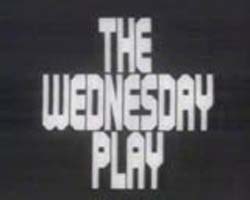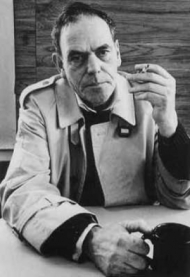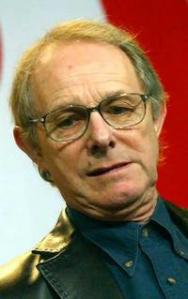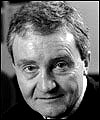BIG FLAME: THE TELEVISION PLAY
Posted by archivearchie on May 23, 2009
The source for the name was not the Manchester pop group (they were of 1983-86 vintage), but a television play. Part of the long running Wednesday Play series on BBC, it was first broadcast on the 19th February 1969. Unlike some other of the Wednesday Plays, it was not be wiped. So it may even appear from time to time at arts cinemas like the National Film Theatre.
“The Big Flame” had a screenplay by Jim Allen, was directed by Ken Loach and produced by Tony Garnett. The actors included Norman Rossington and Godfrey Quigley. The play also launched the acting career of the late Peter Kerrigan. A Communist Party member and former docker, who had been involved in a real dock strike in Liverpool. Kerrigan later played a terminally ill former Liverpool docker, in Alan Bleasdale’s “Boys from the Blackstuff”.
Allen was a member of the Revolutionary Communist Party (which briefly united the different currents of British Trotskyism in the late 1940s and early 1950s). He went with the Gerry Healy current of the RCP on to the Socialist Labour League. He was expelled from Labour Party in 1962 for his membership of this “prescribed organisation”. Allen left the SLL soon after (before it became the WRP) for reasons he refused to discuss. He continued to share much of its politics.
Ken Loach
Ken Loach was originally an actor who moved into direction with “Z Cars” (BBC). He directed six Wedneday Plays including “Up the Junction” (1965) and “Cathy Come Home” (1966). He then moved into feature films. Apart from the Allen collaborations mentioned above, his films have included “Kes” (1969), “Bread and Roses” (2000), “The Wind that Shakes the Barley” (2006) and, most recently, “Looking for Eric” (2009).
He was a member of the Labour Party from 1964 to the mid 1990s. In the 1960s and 70s Loach was one of a group of producers, writers and directors – such as Roy Battersby, Trevor Griffiths, Kenith Trodd, Roland Joffe and Tony Garnett – who were in the orbit of the Socialist Labour League (with varying degree of closeness). Since the 1960s Loach has been a friend of Alan Thornett (then of the SLL/WRP, later of the WSL and ISG), picking Thornett as his “hero” in a 2007 exercise conducted by The Independent newspaper. In recent years Loach has alligned himself with Respect and Socialist Resistance.
Tony Garnett
Tony Garnett began his working life as an actor, became a script editor and then a producer. He produced twelve Wednesday Plays, G.F. Newman’s tv series “Law and Order”, and the film “Kes”. After a spell in Hollywood in the 1980s, he formed an independent production company. This has achieved success on television with “Between the Lines”, “This Life” and “Ballykissangel”.
Garnett was part of the same circle around the Socialist Labour League as Loach. In a 1993 interview with The Independent, he denied earlier newspaper stories about his membership of various political organisations: “None of them true; I’ve never joined a political party in my life.”
Documentary Dramas
Documentary drama television plays adopted the style of documentaries. They were shot on location with hand held cameras and often with unknown or amateur actors.
In the 1960s and 70s there was a press campaign again these plays on television for their perceived left wing bias. They were also criticized for blurring the line between reality and fiction, and thereby confusing the viewer. “Cathy Come Home” and “Days of Hope” were particularly subject to attack. On the one hand it was argued that the facts they were based on were distorted and untrue. On the other they were wrong to pretend they could report reality. Viewers might be lulled into accepting their viewpoint, rather than taking them as pure entertainment.
In a 2002 interview Ken Loach gave a good response: “The idea was not to ask ‘Is the play true?’ but “What truth is there in the play? …The whole argument about objectivity is an impossible concept. The point is: what are they defending in the guise of objectivity?” (in Anthony Hayward Whose Side are You On? p71).
The Play
 The Big Flame” was one of three plays on political subjects with Jim Allen as the scriptwriter which helped spark this controversy. The first was “The Lump”, another Wednesday Play from 1967 about the Building trade, with Garnett and Jack Gold as the director. The last was “Rank and File”, a Play for Today from 1971 about the Pilkington Glass strike, with Loach and Graeme McDonald as producer. “The Big Flame” was about an occupation of the Liverpool docks. It was made after the Devlin report recommended decasualisation of the docks and before the Upper Clyde Shipbuilders sit-in. It was filmed entirely on location in Liverpool in 20 days (19 Feb to 16 March 1968).
The Big Flame” was one of three plays on political subjects with Jim Allen as the scriptwriter which helped spark this controversy. The first was “The Lump”, another Wednesday Play from 1967 about the Building trade, with Garnett and Jack Gold as the director. The last was “Rank and File”, a Play for Today from 1971 about the Pilkington Glass strike, with Loach and Graeme McDonald as producer. “The Big Flame” was about an occupation of the Liverpool docks. It was made after the Devlin report recommended decasualisation of the docks and before the Upper Clyde Shipbuilders sit-in. It was filmed entirely on location in Liverpool in 20 days (19 Feb to 16 March 1968).
“The Big Flame” was set in the “near future”. A strike in the Liverpool docks is lead by an unofficial strike committee including Danny Fowler (Norman Rossington) and Peter Connor (Peter Kerrigan). They go out on strike in defiance of their union, mainly as a response to the threatened casualisation of the workforce. Strikers are seen discussing the progress of the strike, while voice-over narrators provide analysis. After six weeks the strikers are persuaded by a blacklisted union organiser Jack Regan (Godfrey Quigley), a former Communist turned Trotskyist, to move the strike from the “the industrial to the political” by occupying the docks and running them. Regan argues: “There’ll be no revolution, but you’ll have lit a bonfire” (hence the Big Flame). After 5 days the occupation ends when the police and the army move in during the middle of the night . Fowler, Connor and Regan get three year prison sentences. Outside the court young workers start organising again. The message of the film is clear when on the last night of the occupation an American sailor sings “The Ballad of Joe Hill”. He may have been killed, but he didn’t die.
Recently Ken Loach talked about “The Big Flame”: “In 1968, I made the film The Big Flame in Liverpool, a fictional story set in the Liverpool docks written by the late Jim Allen, who was from Manchester. I was just stunned by the political maturity of the people I met. They were sophisticated, militant and organised. …That whole experience had a big effect on me – much bigger than making a film like Cathy Come Home. …People talk a lot about the humour of Liverpool people, but they absolutely miss the politics. That’s what I found very impressive – and it’s still impressive.” (Liverpool Echo 7th March 2008)
Reception
The play was ready for transmission by May 1968. The BBC postponed showing it twice, and there were doubts that it would ever be broadcast before its February 1969 appearance. There was a predictable storm of protest. The Daily Mail labeled the play a “Marxist play presented as sermon”. Mary Whitehouse, Secretary of the National Viewers’ and Listeners’ Association, complained that the play was “a blueprint for the communist takeover of the docks” and wrote to the Prime Minister and the Leader of the Opposition urging a review of the BBC’s charter. Tom Jackson, General Secretary of the Union of Post Office Workers, also wrote a letter of protest to Lord Hill, Chairman of the Governors of the BBC.
After “The Big Flame” a new regime at the BBC insisted that in future all plays should have no more than ten minutes of outside filming. This led Tony Garnett to quit the BBC. In time the BBC stopped showing plays in the documentary drama style.
The Allen/Loach/Garnett plays were also criticised by some on the left. Some found their politics too simplistic and didactic. Other criticised their realistic style. For example, those associated with the theoretical film journal Screen claimed that it was impossible for the “classic realist text” to offer any perspective for struggle due to their inability to investigate contradiction. To be truely subversive a film needed to be radical in form as well as content.
I must confess that I have never seen “The Big Flame”. Therefore, it is hard for me to defend the film from these critics. However, sticking to the general issues and not defending all the films in the drama documentary style, I am strongly critical of the perspectives of Screen and its ilk.
Archive Archie
Read more
The following articles have helped me write this post:
BFI Screenonline on “The Big Flame”
Wednesday Play site on “The Big Flame”
Essay on “The Rank and File” (another Jim Allen/Ken Loach collaboration) by John Williams on the University of Hull site (which also discusses “The Big Flame”)
Also helpful were some books which mention “The Big Flame”: Jacob Leigh The Cinema of Ken Loach (Wallflower Press, 2002); Anthony Hayward Whose Side are You On?: Ken Loach and his Films (Bloomsbury, 2004) and a chapter on Jim Allen by Paul Madden in George W. Brandt (ed) British Television Drama (Cambridge University Press, 1981).
There is a Jim Allen archive at the Working Class Movement Library in Salford (from whose website I borrowed the photo of Jim Allen)



archivearchie said
I have still not seen the whole film, but I have viewed some film clips from it. The BFI Screen on-line page on “The Big Flame” mentioned above (http://www.screenonline.org.uk/tv/id/557251/) has in the top right hand corner a list of clips. These can be viewed by the general public only through a public or academic institution library (the service is free so all libraries should be asked to join). I have now managed to find a library which has a subscription. There are four clips, and I’m give a synopsis of each.
1. The Government Line
The scene is a meeting between a Government representative and trade union officials.
The Government rep says: Changes to working habits and bound to create a climate of fear and apprehension. Certain groups of irresponsible people will exploit these to ferment strikes. It is the function of government to govern. There will come a time when we will be forced to intervene if a union is unable to control its members, not matter how distasteful this is. I appeal to the Port Workers Committee to abandon disruption and criminal activity, and bring about some form of peace and prosperity for the whole industry.
2. Something Practical
Danny Fowler and Peter Connor meet Jack Regan in a pub.
Danny says: The bosses are setting up for us. There will be speed ups, slashing jobs. All this chat about capitalism, there has got to be something practical now.
Jack replies: You need to shift from the industrial to the political. You are not doing to win unless you change course. Then there is no guarantee. The dockers need to take over the ports. Docking is a simple business. The entire operation is carried out by the men who do the graft. Why shouldn’t they take over.
Danny: they will just knock us off.
Jack: Even if you succeed and get hold of the dock, there will be no revolution or something. The employers will throw everything at us – the government, the police, troops, the kitchen sink. If we hold out for a few days, Merseyside dockers will have lit a flame which can be seen by workers for miles around.
3. The Workers’ State
Various voices speak over scenes of dockers at work.
– In place of the Docks and Harbour Board we need a workers’ Council.
– Docking is a simple business made complicated by duplication. You don’t need to be a genius. You need experience, technical know how.
– I’m now just talking about the docks. Every pit, factory, building site. Working people need to elect their own delegates. They will be subject to immediate recall. They will have to explain every decision.
4. Crushing the Workers
As police grapple with dockers, trucks move in. troops get out, then drag dockers into them. More dockers arrive, and a man with a megaphone speaks to them (as the dockers know him, he is probably one of the bosses rather than police).
He says: Settle down and put down your sticks. You will be allowed to return home. It’s the ring leaders we are after. Jack Regan and Danny Fowler are both under arrest.
The dockers discuss what to do.
One says: We’ve had 5 days. I believe if Regan and Danny were here, they would call it a day. There is no sense getting are heads kicked in. We should go out of here organised. The same way we came in.
One docker dissents, and attacks the man with a megaphone. A full scale battle ensues. The docker is beaten up, and lies unconscious.
Judging the film by these short clips (about 15 minutes in total), the message is pretty strong and clear. However it is well realised, and doesn’t come over as overly crude and simplistic.
ryan said
could you please help me find some footage of The Wednesday Play : The Big Flame, online as i cant find any
Ivan "Chuck" Chandler said
THE BIG FLAME
Who played the drumming music heard at one point of the film and later over the closing credits?
Ed said
The film was also the first time that the word “shit” was used on the BBC, beating John Cleese by a few months.
‘Callan’: Television’s First Anti-Establishment Spy Series said
[…] controversial British television films with explicitly radical socialist sympathies, including The Big Flame (1969), The Rank and File (1971), and Leeds – United! (1974). Although far less […]